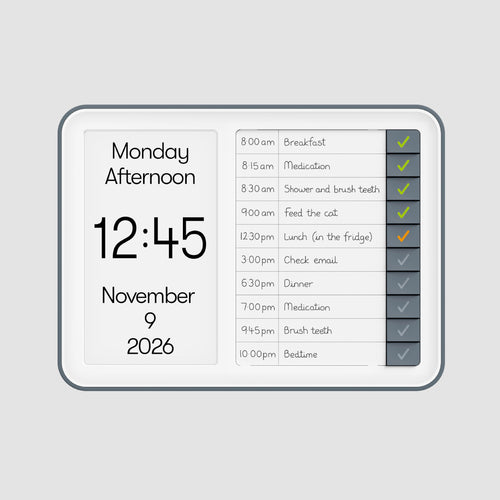As a person progresses along their dementia journey, it may become more noticeable that their behaviour may change. A loss in communication skills can be very common and this may cause frustration or worry. It is important if your loved one shows signs of communication skills changing, to remain positive and focus on their strengths. Focusing on the positives can help to build a stronger relationship and in turn help your loved one to open up and It reassures them in times of frustration. Here we will explore the importance of using positive language when caring for someone living with dementia.
What is Positive Language?
Positive language is that which focuses on strength rather than weakness, and presents an optimistic outlook. As dementia progresses, there are many changes that your loved one may go through, and it is important to acknowledge these as changes without negativity.
When using positive language it reinforces the notion that your loved one can still live a fulfilled life with dementia and helps to ensure communication is kept open. Positive language is not just the words you use but also your reaction to situations; if your loved one is upset or frustrated rather than reacting with frustration yourself, you should remain calm and reassuring as this will help soothe them. Positive language should be calming, optimistic and reassuring but never patronising.
Why is Positive Language Beneficial?
There are many benefits to using positive language when communicating with those living with dementia. As dementia progresses, communication can become more difficult, but the use of positive language can encourage better communication and offers the opportunity to really connect with your loved one and understand how they are feeling.
There are various ways positive language can also be used in difficult or stressful situations as a way of distraction. Should your loved one become frustrated or stressed the best course of action is to work around what could be causing this, and by utilising positivity it can reassure your loved one that everything is ok.
How to Incorporate Positive Language
There are various ways to include positive language as part of caring for someone living with dementia, as mentioned before it is not only through speech itself but also through facial expressions and body language. Sometimes the most positive language is as simple as a smile. As those living with dementia sometimes have difficulty communicating, facial expressions and reactions are often more likely to be understood and appreciated.
Positive language can be a great way to turn a situation around and provide distraction from what could be a difficult situation. For example, if your loved one begins talking about a person who is no longer around; wanting to see them or talk to them, the best course of action would not be to disagree with them but instead to start a conversation about said person and encourage reminiscence. Positive language involves being able to inject positivity into any situation and make the most of it.
Examples of Positive Language
Using positive language is important both when communicating with those living with dementia and when talking about someone living with dementia and their families. In order to help you better communicate about dementia we’ve included some simple swaps you can make when discussing it.
- Rather than saying “challenging behaviour” describe the behaviour. Eg. “frustrated” or “agitated”. Another term which can be used is “responsive behaviour”.
- Don’t refer to a person living with dementia as a “patient” or “victim” as this is negative and adds to the stigma which can already be associated with dementia. Instead use phrases such as “a person living with dementia” or similar.
Don’t refer to giving care as “handling” a person with dementia as this sounds impersonal and aggressive; instead say “care for”.
There may be times when your loved one becomes frustrated or stressed and it can be difficult to stay positive but knowing how to use positive language in situations like this can be extremely beneficial. When talking to your loved one; take a step back and consider your language before you speak, there are a few simple swaps you can make to incorporate more positive language. We’ve included some examples of how to make your language more positive below;
- Rather than “you can’t drive anymore” suggest “why don’t we walk, it’s a nice day”.
- Instead of “you can’t go home” say “we are home, what are some of your favourite things about home”.
- Don’t tell your loved one they are “wrong” when they make mistakes, instead encourage them to try again or try something new.
- If a person living with dementia has confusion about who you are, rather than saying “that’s not me”, instead tell them about the person they have mentioned and tell them why you’ve come to see them.






















